Unit 1 What's the matter? Section A(3a-3c)课件(共47张PPT)+内嵌音频
文档属性
| 名称 | Unit 1 What's the matter? Section A(3a-3c)课件(共47张PPT)+内嵌音频 | 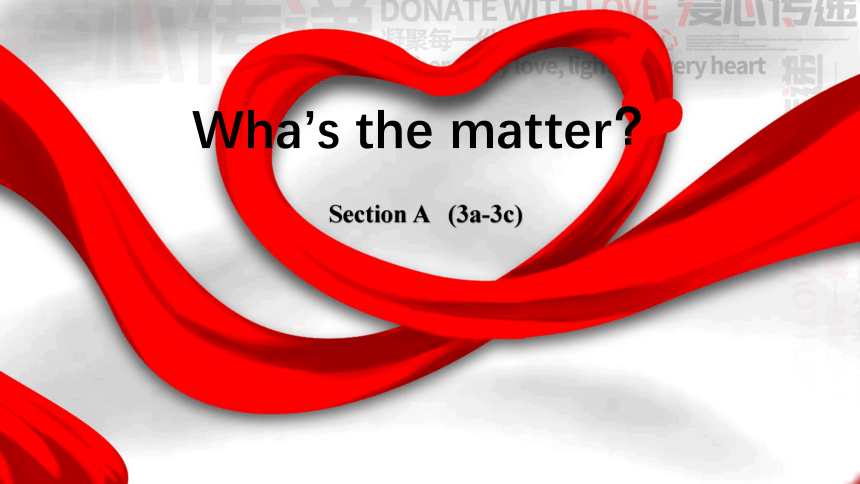 | |
| 格式 | pptx | ||
| 文件大小 | 131.8MB | ||
| 资源类型 | 试卷 | ||
| 版本资源 | 人教新目标(Go for it)版 | ||
| 科目 | 英语 | ||
| 更新时间 | 2023-01-03 21:52:11 | ||
图片预览

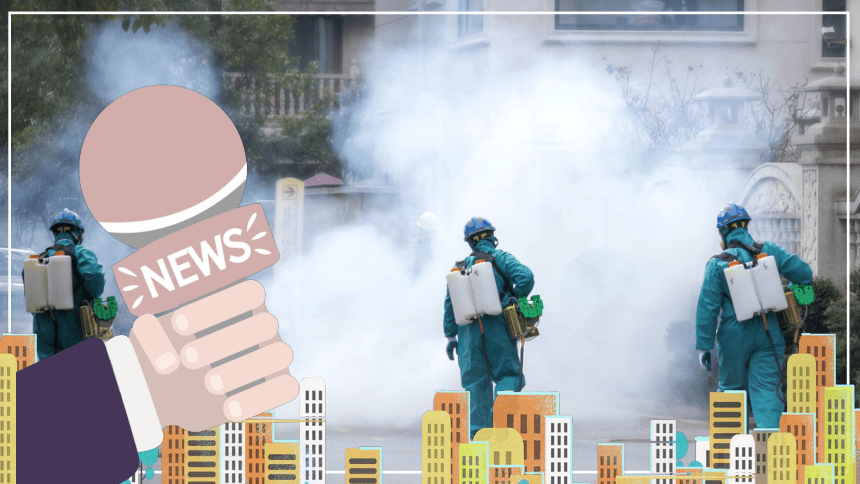
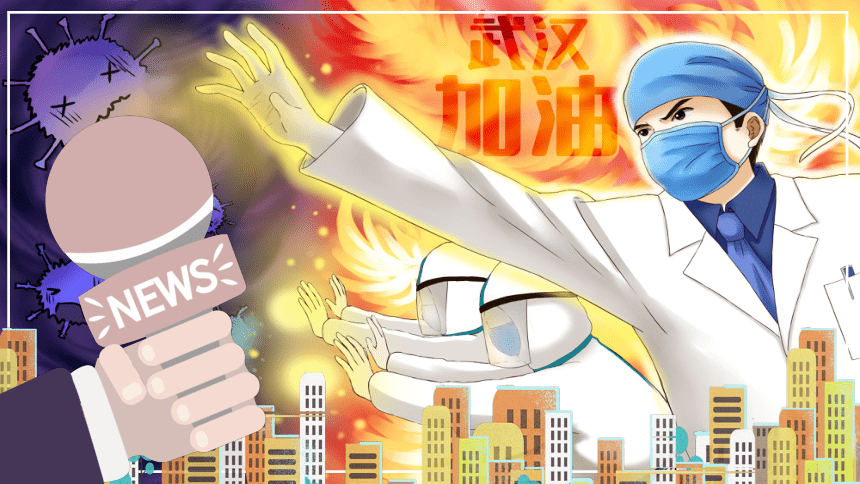
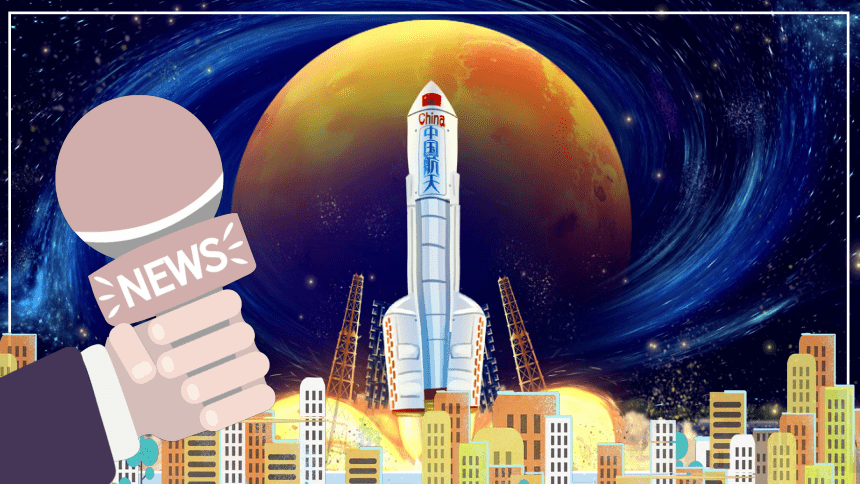
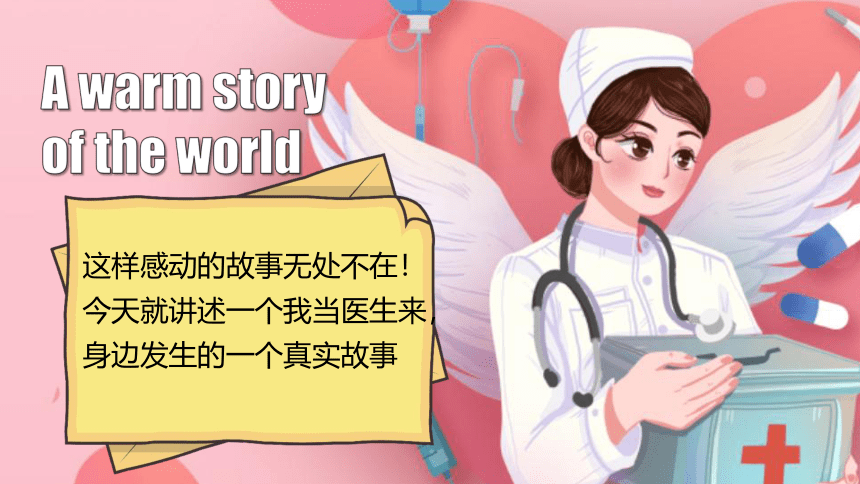

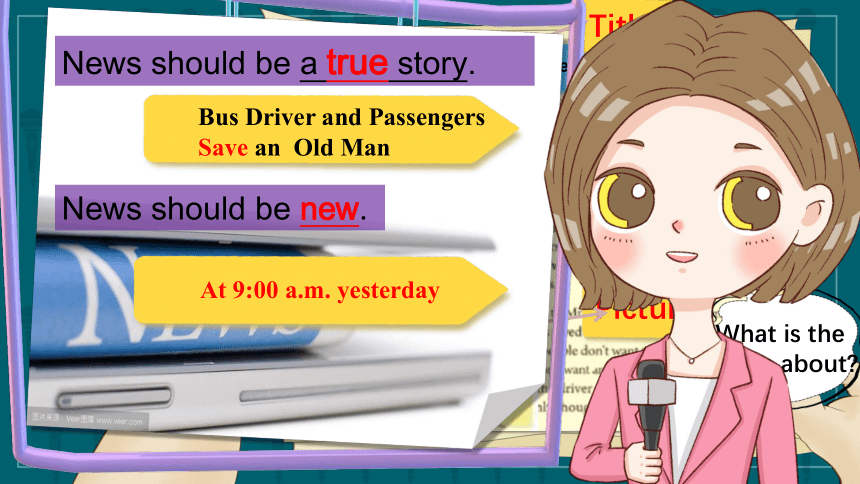
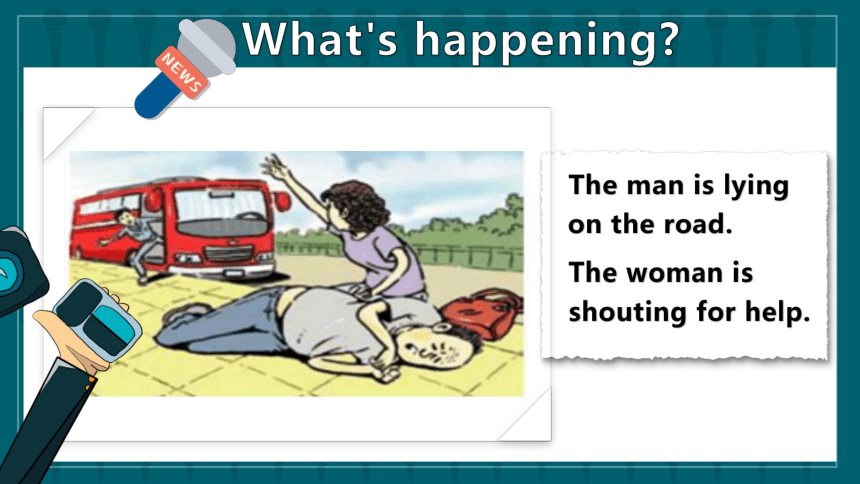
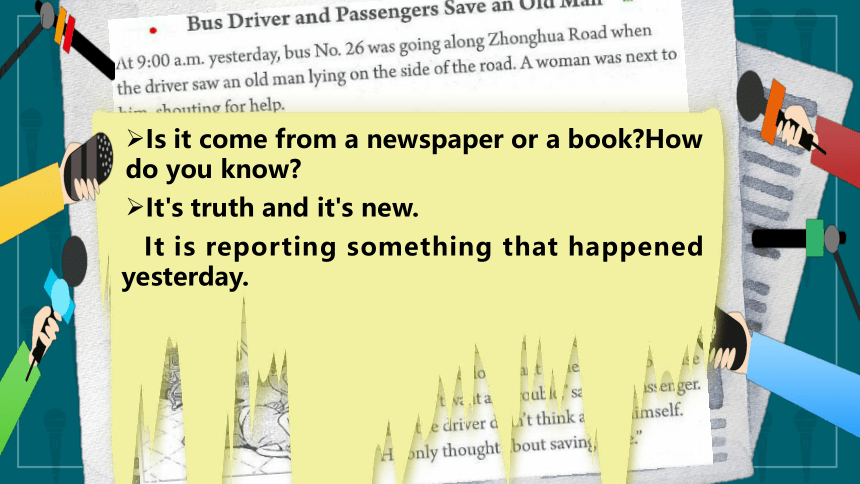

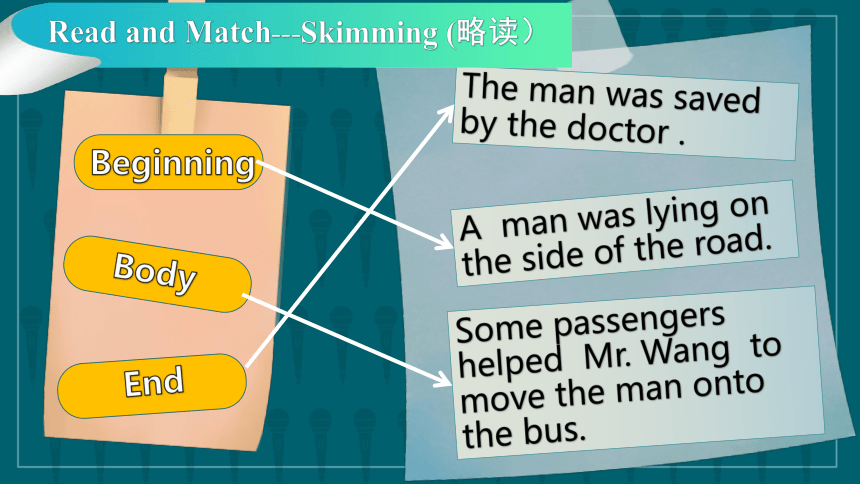
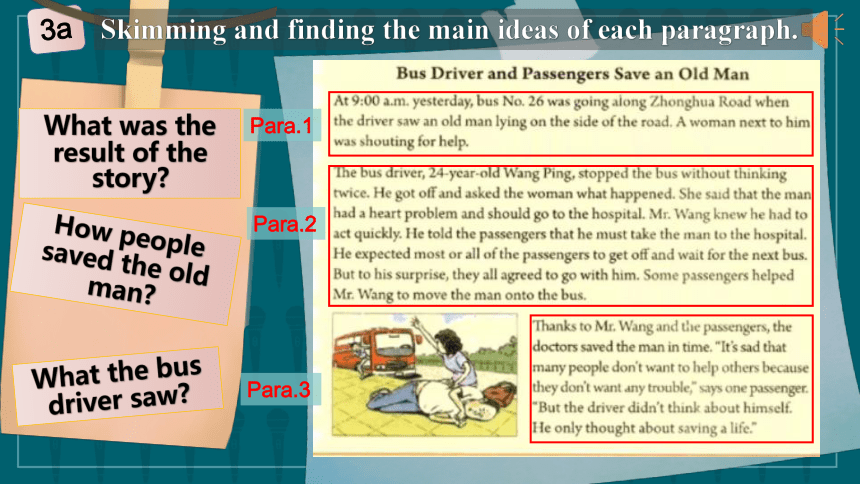
文档简介
(共47张PPT)
Wha’s the matter?
Section A (3a-3c)
A warm story
of the world
这样感动的故事无处不在!
今天就讲述一个我当医生来,
身边发生的一个真实故事
News is everywhere.
Bus Driver and Passengers Save an Old Man
Title
Picture
What is the news about
News
News should be a true story.
News should be new.
Bus Driver and Passengers Save an Old Man
At 9:00 a.m. yesterday
What's happening
The man is lying on the road.
The woman is shouting for help.
Is it come from a newspaper or a book How do you know
It's truth and it's new.
It is reporting something that happened yesterday.
Let's read the story together!
The man was saved by the doctor .
A man was lying on the side of the road.
Some passengers helped Mr. Wang to move the man onto the bus.
Beginning
Body
End
Read and Match---Skimming (略读)
3a
What was the result of the story
How people saved the old man
What the bus driver saw
Skimming and finding the main ideas of each paragraph.
Para.1
Para.2
Para.3
Read the passage carefully and find out the answers.
When
Who
What
Why
Where
At 9:00 a.m. yesterday, bus No.26 was going along Zhonghua Road when the driver saw an old man lying on the side of the road. A woman next to him was shouting for help.
Para.1
Bus Driver and Passengers
Save an Old Man
Scanning(查读)
Read carefully to get detailed
information.
The driver saw an old man __________________ ______ on the side of the road.
saw an old man
What?
Read Paragraph 1
lying
At 9:00 a.m. yesterday.
On the side of Zhonghua Road.
The bus driver,
24-year-old Wangping.
When
Where
Read Paragraph 1
Who
Para.2
Bus Driver and Passengers
Save an Old Man
The bus driver, 24-year-old Wang Ping, stopped the bus without thinking twice. He got off and asked the woman what happened. She said that the man had a heart problem and should go to the hospital. Mr. Wang knew he had to act quickly. He told the passengers that he must take the man to the hospital. He expected most or all of the passengers to get off and wait for the next bus. But to his surprise, they all agreed to go with him. Some passengers helped Mr. Wang to move the man onto the bus.
How
stopped
got
asked
told
knew
expected
Without thinking twice
to his surprise
Wang Ping
shouted for help
A woman
agreed to go with
helped to move
passengers
The bus driver, 24-year-old Wang Ping, stopped the bus without thinking twice. He got off and asked the woman what happened. She said that the man had a heart problem and should go to the hospital. Mr. Wang knew he had to act quickly. He told the passengers that he must take the man to the hospital. He expected most or all of the passengers to get off and wait for the next bus. But to his surprise, they all agreed to go with him. Some passengers helped Mr. Wang to move the man onto the bus.
1. Some passengers helped the driver to move the man onto the bus.
2. The driver stopped the bus without thinking twice.
3. He expected some passengers to get off and wait for the next bus.
4. Passengers all agreed to go with him.
5. The driver got off and asked what happened.
2, 5, 3, 4, 1
Read para. 2 and put the sentences in correct order.
1. ________ Wang Ping was the driver of bus No.26 at 9:00 a.m. yesterday.
2. ________ Bus No.26 hit an old man on Zhonghua Road.
3. ________ The old man had a heart problem and needed to go to the hospital right away.
Read the passage again and check (√) the things that happened in the story.
4.________ The passengers on the bus did not want to go to the hospital, so only Wang Ping went with the woman and old man.
5.________ Some passengers helped to get the old man onto the bus.
6.________ The old man got to the hospital in time.
Read the passage again and check (√) the things that happened in the story.
Something happened at 9:00a.m.yesterday.
Bus driver's reaction
Passengers' reaction
Result
Time order
An old man was lying on the side of the road.
The bus drive stopped the car. The passengers helped Mr. Wang to move the man onto the bus.
The man
was saved.
Fill in the blanks according to the story.
Wang Ping, a bus driver, was going _______ Zhonghua Road when he saw an old man _______ on the side of the road and a woman next to him shouting for help. He stopped the bus without ________________. He got off and asked the woman _______ happened. She said that the man had a heart __________ and should go to the hospital. Wang Ping told the passengers that he must ______ the man to the hospital.
along
lying
thinking twice
what
problem
take
Para.3
Thanks to Mr. Wang and the passengers, the man was saved by the doctors in time. “It’s sad that many people don’t want to help others because they don’t want any trouble,” says one passenger. “But the driver didn’t think about himself. He only thought about saving a life.”
Why
saving a life
Thanks to….
don’t want trouble
It’s sad that...
Retell the story
Discussion
Why was Wang Ping surprised that the passengers agreed to go to the hospital with him
Because he thought that there were no passengers who agreed to go with him.
Discussion
Did the passengers think Wang Ping did the right thing How do you know
Yes, they did. Because they went with him together.
Discussion
Do you agree that people often do not help others because they do not want to get into trouble Why or why not?
Yes, I do. Because people don't want to get themselves into trouble.
Thinking
Which side are you on
Come and explore
考点2
e.g. I must think twice before I can promise.
在我答应之前,我必须慎重考虑一下。
get off 下车
考点3
think twice 再三考虑;慎重考虑
考点1
see sb. doing sth. 看见某人正在做某事
get on 上(公共汽车)
get off 下(公共汽车)
get into 上(小汽车)
get out of 下(小汽车)
考点4
happen /'h p n/ vi. (to take place, especially without being planned) 发生
不及物动词,不能用于被动语态,且不与表示一段时间的状语连用。
e.g. An accident happened in that street. 表示“某人出了某事(常指不好的事)”,用句型Sth. happened to sb.。
考点5
expect / k'spekt/ v. 预料;期盼;盼望
e.g. We expect you to help us. 我们期盼你帮助我们。
I expect to be back within a week. 我预计一周之内回来。
to one’s surprise 使某人惊讶的是
考点6
e.g. To my surprise, Lisa won the first prize in the singing
competition.
让我惊讶的是,莉萨在唱歌比赛中获得一等奖。
agree to do sth. 同意做某事
e.g. She agreed to help me. 她同意帮助我。
考点7
考点8
e.g. Thanks to/Because of the warm and sunny weather, oranges grow very well here.
由于气候温和、阳光充足,这里的橘子生长得非常好。
thanks to 多亏;由于
考点9
in time 及时
辨析:in time 与on time
in time 及时 强调正好赶上事先约定的时间,没有迟到。
on time 准时 按计划做某事,强调不迟到,不早不晚。
e.g. Passengers get on the train on time.
乘客们准时上火车。
考点10
e.g. The less trouble, the better.
(谚)多一事不如少一事。
trouble /'tr bl/ n.&v. 问题;苦恼;麻烦
考点11
hit /h t/ v.( 用手或器具) 击;打
e.g. He hit me on the head with a book.
考点12
right away 立即;马上
e.g. He set off right away hearing the news.
Grammar Focus
Have for
different meanings
1. 作“有”讲。 如:
I have a bag. 我有一个包。
He has a red cup. 他有一个红杯子。
2. 作“吃、喝”讲。如:
have breakfast (吃早饭) have tea (喝茶)
have a biscuit (吃块饼干) have a drink (喝点水)
3. 作“患病”讲。
have a cold, have a fever
4. 固定短语
have a try, have a look, have a party
本单元知识点,用have来讨论健康问题。
Modal verbs should/shouldn’t
for suggestions
情态动词可以用来表示“提议”、“建议”或“请求”等。
情态动词should作“应该;应当;可以”讲,用以表达职责和义务、提出劝告,而且表述的是自己的主观看法,其后接动词原形。
should的否定形式是should not/ shouldn’t,意思是“不应当;不该”。
含有should的肯定句变一般疑问句时, 应将should提到句首:
She should take her temperature.
Should she take her temperature
肯定回答:Yes, 主语+should.
Yes,she should.
否定回答:No, 主语+shouldn’t.
No, she shouldn’t.
注意:should无人称、时态变化。 should + 动词原形
Reflexive pronouns
反身代词
表示反射或强调的代词叫做反身代词。可译为“本人”、“本身”,也常译为“亲自”、“自己” 。其形式如下表:
人称 数 第一人称 第二人称 第三人称
单数
复数
myself
yourself
himself herself
itself
ourselves
yourselves
themselves
注意:反身代词跟在动词或者介词的后边;
反身代词可以作表语或者同位语。
判断句子:
1. Myself can finish my homework.
2. I’m drawing with myself crayons.
正确句子:
1. I myself can finish my homework. /
I can finish my homework myself.
2. I’m drawing with my own crayons.
be generous
in giving help
Be a warm person
Wha’s the matter?
Section A (3a-3c)
A warm story
of the world
这样感动的故事无处不在!
今天就讲述一个我当医生来,
身边发生的一个真实故事
News is everywhere.
Bus Driver and Passengers Save an Old Man
Title
Picture
What is the news about
News
News should be a true story.
News should be new.
Bus Driver and Passengers Save an Old Man
At 9:00 a.m. yesterday
What's happening
The man is lying on the road.
The woman is shouting for help.
Is it come from a newspaper or a book How do you know
It's truth and it's new.
It is reporting something that happened yesterday.
Let's read the story together!
The man was saved by the doctor .
A man was lying on the side of the road.
Some passengers helped Mr. Wang to move the man onto the bus.
Beginning
Body
End
Read and Match---Skimming (略读)
3a
What was the result of the story
How people saved the old man
What the bus driver saw
Skimming and finding the main ideas of each paragraph.
Para.1
Para.2
Para.3
Read the passage carefully and find out the answers.
When
Who
What
Why
Where
At 9:00 a.m. yesterday, bus No.26 was going along Zhonghua Road when the driver saw an old man lying on the side of the road. A woman next to him was shouting for help.
Para.1
Bus Driver and Passengers
Save an Old Man
Scanning(查读)
Read carefully to get detailed
information.
The driver saw an old man __________________ ______ on the side of the road.
saw an old man
What?
Read Paragraph 1
lying
At 9:00 a.m. yesterday.
On the side of Zhonghua Road.
The bus driver,
24-year-old Wangping.
When
Where
Read Paragraph 1
Who
Para.2
Bus Driver and Passengers
Save an Old Man
The bus driver, 24-year-old Wang Ping, stopped the bus without thinking twice. He got off and asked the woman what happened. She said that the man had a heart problem and should go to the hospital. Mr. Wang knew he had to act quickly. He told the passengers that he must take the man to the hospital. He expected most or all of the passengers to get off and wait for the next bus. But to his surprise, they all agreed to go with him. Some passengers helped Mr. Wang to move the man onto the bus.
How
stopped
got
asked
told
knew
expected
Without thinking twice
to his surprise
Wang Ping
shouted for help
A woman
agreed to go with
helped to move
passengers
The bus driver, 24-year-old Wang Ping, stopped the bus without thinking twice. He got off and asked the woman what happened. She said that the man had a heart problem and should go to the hospital. Mr. Wang knew he had to act quickly. He told the passengers that he must take the man to the hospital. He expected most or all of the passengers to get off and wait for the next bus. But to his surprise, they all agreed to go with him. Some passengers helped Mr. Wang to move the man onto the bus.
1. Some passengers helped the driver to move the man onto the bus.
2. The driver stopped the bus without thinking twice.
3. He expected some passengers to get off and wait for the next bus.
4. Passengers all agreed to go with him.
5. The driver got off and asked what happened.
2, 5, 3, 4, 1
Read para. 2 and put the sentences in correct order.
1. ________ Wang Ping was the driver of bus No.26 at 9:00 a.m. yesterday.
2. ________ Bus No.26 hit an old man on Zhonghua Road.
3. ________ The old man had a heart problem and needed to go to the hospital right away.
Read the passage again and check (√) the things that happened in the story.
4.________ The passengers on the bus did not want to go to the hospital, so only Wang Ping went with the woman and old man.
5.________ Some passengers helped to get the old man onto the bus.
6.________ The old man got to the hospital in time.
Read the passage again and check (√) the things that happened in the story.
Something happened at 9:00a.m.yesterday.
Bus driver's reaction
Passengers' reaction
Result
Time order
An old man was lying on the side of the road.
The bus drive stopped the car. The passengers helped Mr. Wang to move the man onto the bus.
The man
was saved.
Fill in the blanks according to the story.
Wang Ping, a bus driver, was going _______ Zhonghua Road when he saw an old man _______ on the side of the road and a woman next to him shouting for help. He stopped the bus without ________________. He got off and asked the woman _______ happened. She said that the man had a heart __________ and should go to the hospital. Wang Ping told the passengers that he must ______ the man to the hospital.
along
lying
thinking twice
what
problem
take
Para.3
Thanks to Mr. Wang and the passengers, the man was saved by the doctors in time. “It’s sad that many people don’t want to help others because they don’t want any trouble,” says one passenger. “But the driver didn’t think about himself. He only thought about saving a life.”
Why
saving a life
Thanks to….
don’t want trouble
It’s sad that...
Retell the story
Discussion
Why was Wang Ping surprised that the passengers agreed to go to the hospital with him
Because he thought that there were no passengers who agreed to go with him.
Discussion
Did the passengers think Wang Ping did the right thing How do you know
Yes, they did. Because they went with him together.
Discussion
Do you agree that people often do not help others because they do not want to get into trouble Why or why not?
Yes, I do. Because people don't want to get themselves into trouble.
Thinking
Which side are you on
Come and explore
考点2
e.g. I must think twice before I can promise.
在我答应之前,我必须慎重考虑一下。
get off 下车
考点3
think twice 再三考虑;慎重考虑
考点1
see sb. doing sth. 看见某人正在做某事
get on 上(公共汽车)
get off 下(公共汽车)
get into 上(小汽车)
get out of 下(小汽车)
考点4
happen /'h p n/ vi. (to take place, especially without being planned) 发生
不及物动词,不能用于被动语态,且不与表示一段时间的状语连用。
e.g. An accident happened in that street. 表示“某人出了某事(常指不好的事)”,用句型Sth. happened to sb.。
考点5
expect / k'spekt/ v. 预料;期盼;盼望
e.g. We expect you to help us. 我们期盼你帮助我们。
I expect to be back within a week. 我预计一周之内回来。
to one’s surprise 使某人惊讶的是
考点6
e.g. To my surprise, Lisa won the first prize in the singing
competition.
让我惊讶的是,莉萨在唱歌比赛中获得一等奖。
agree to do sth. 同意做某事
e.g. She agreed to help me. 她同意帮助我。
考点7
考点8
e.g. Thanks to/Because of the warm and sunny weather, oranges grow very well here.
由于气候温和、阳光充足,这里的橘子生长得非常好。
thanks to 多亏;由于
考点9
in time 及时
辨析:in time 与on time
in time 及时 强调正好赶上事先约定的时间,没有迟到。
on time 准时 按计划做某事,强调不迟到,不早不晚。
e.g. Passengers get on the train on time.
乘客们准时上火车。
考点10
e.g. The less trouble, the better.
(谚)多一事不如少一事。
trouble /'tr bl/ n.&v. 问题;苦恼;麻烦
考点11
hit /h t/ v.( 用手或器具) 击;打
e.g. He hit me on the head with a book.
考点12
right away 立即;马上
e.g. He set off right away hearing the news.
Grammar Focus
Have for
different meanings
1. 作“有”讲。 如:
I have a bag. 我有一个包。
He has a red cup. 他有一个红杯子。
2. 作“吃、喝”讲。如:
have breakfast (吃早饭) have tea (喝茶)
have a biscuit (吃块饼干) have a drink (喝点水)
3. 作“患病”讲。
have a cold, have a fever
4. 固定短语
have a try, have a look, have a party
本单元知识点,用have来讨论健康问题。
Modal verbs should/shouldn’t
for suggestions
情态动词可以用来表示“提议”、“建议”或“请求”等。
情态动词should作“应该;应当;可以”讲,用以表达职责和义务、提出劝告,而且表述的是自己的主观看法,其后接动词原形。
should的否定形式是should not/ shouldn’t,意思是“不应当;不该”。
含有should的肯定句变一般疑问句时, 应将should提到句首:
She should take her temperature.
Should she take her temperature
肯定回答:Yes, 主语+should.
Yes,she should.
否定回答:No, 主语+shouldn’t.
No, she shouldn’t.
注意:should无人称、时态变化。 should + 动词原形
Reflexive pronouns
反身代词
表示反射或强调的代词叫做反身代词。可译为“本人”、“本身”,也常译为“亲自”、“自己” 。其形式如下表:
人称 数 第一人称 第二人称 第三人称
单数
复数
myself
yourself
himself herself
itself
ourselves
yourselves
themselves
注意:反身代词跟在动词或者介词的后边;
反身代词可以作表语或者同位语。
判断句子:
1. Myself can finish my homework.
2. I’m drawing with myself crayons.
正确句子:
1. I myself can finish my homework. /
I can finish my homework myself.
2. I’m drawing with my own crayons.
be generous
in giving help
Be a warm person
同课章节目录
- Unit 1 What's the matter?
- Section A
- Section B
- Unit 2 I'll help to clean up the city parks.
- Section A
- Section B
- Unit 3 Could you please clean your room?
- Section A
- Section B
- Unit 4 Why don't you talk to your parents?
- Section A
- Section B
- Unit 5 What were you doing when the rainstorm came
- Section A
- Section B
- Review of Units 1-5
- Unit 6 An old man tried to move the mountains.
- Section A
- Section B
- Unit 7 What's the highest mountain in the world?
- Section A
- Section B
- Unit 8 Have you read Treasure Island yet?
- Section A
- Section B
- Unit 9 Have you ever been to a museum?
- Section A
- Section B
- Unit 10 I've had this bike for three years.
- Section A
- Section B
